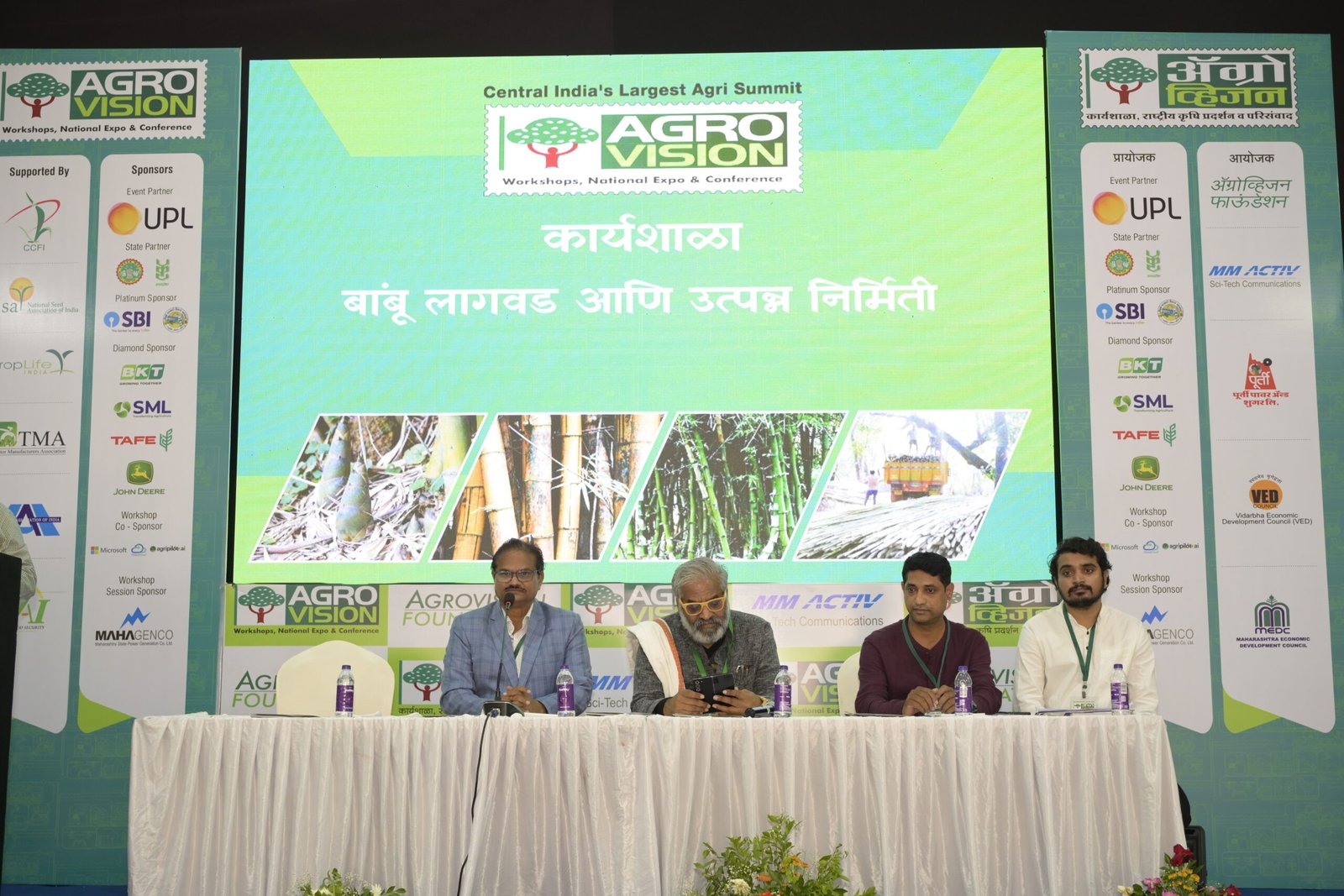Monday, 2 February 2026

Pasha Patel, Chairman, Maharashtra State Agricultural Price Commission, outlines ethanol and biomass prospects as scientists and artisans build a comprehensive value chain
Maharashtra’s ambitious green transition received a decisive push as Pasha Patel, Chairman, Maharashtra State Agricultural Price Commission, foregrounded the transformative prospects of ethanol production and biomass generation from bamboo, framing it as one of the most consequential opportunities for India’s low-carbon future. Speaking at a landmark convergence of policymakers, scientists, and artisan leaders, Patel noted that bamboo’s rapid growth cycle, high cellulose content, and suitability for degraded lands position it as a strategic feedstock that can complement India’s 2G ethanol ecosystem. With the country pushing toward a 20 percent blending target and industries scouting for non-food biomass sources, bamboo offers a scalable and climate-resilient alternative to sugarcane and crop residue. Patel emphasised that bamboo can anchor a new class of green industries ranging from pellets and briquettes to biochar, renewable construction materials, and co-firing biomass for thermal energy, creating a circular economy spanning agriculture, forestry, and energy.
Against this policy backdrop, Maharashtra’s scientific community is moving rapidly to build a credible production foundation for the bamboo economy. Dr. Vijay Ilorkar, Principal Scientist and Head of Agroforestry and former Associate Dean at AICRP on Agroforestry, PDKV College of Agriculture, Nagpur, outlined a comprehensive blueprint for integrating bamboo into sustainable farming landscapes. He explained that PDKV’s research has enabled the transition from forest-dependent extraction to scientifically managed bamboo agroforestry systems that deliver predictable yields, uniform quality, and industrial-grade biomass.
The institution has developed a suite of farming models including dedicated plantations, high-density commercial blocks, mixed bamboo-based agroforestry combinations suited to smallholders, and boundary plantations designed for low-input dryland farms. These models are especially relevant for Maharashtra’s vast wastelands, where bamboo species such as Bambusa tulda have demonstrated exceptional performance. With a recorded biomass yield of 48.81 tonnes per hectare, a harvesting cost of Rs 22,888, and a cost–benefit ratio of 2.86, B. tulda has emerged as one of the most economically attractive crops for farmers seeking diversification beyond traditional horticulture.
Dr. Ilorkar highlighted that advances in vegetative propagation are enabling large-scale availability of high-quality planting material, which is critical for industrial buyers who require consistency in fibre structure for ethanol, engineered bamboo, and biomass energy applications. Parallel to agronomy, PDKV and partnering institutions are shaping the infrastructural backbone that has long been missing in India’s bamboo sector.
Plans include bamboo craft museums and design galleries to demonstrate contemporary and tribal aesthetics, processing workshops for slats, boards, and engineered components, modular construction units for bamboo-based housing solutions, and clusters for charcoal and biochar production to supply emerging carbon markets. Food applications such as bamboo shoots, flour, and functional beverages are also gaining prominence, while dedicated procurement channels are being designed to connect farmers with industrial buyers of biomass and construction-grade material. This marks a decisive shift in policy thinking that acknowledges bamboo not merely as a forest product but as an industrial raw material capable of driving rural transformation.
While scientists build the production base, the cultural and economic heart of Maharashtra’s bamboo ecosystem beats in Gadchiroli, home to some of India’s most skilled tribal artisans. Leaders such as Swapnil Giride and Chetan Nagarkar showcased how the region’s artisans, supported by the Science and Technology Resource Centre (STRC), are shaping a new community-driven bamboo movement. Gadchiroli’s deep cultural connection with bamboo, combined with its vast natural endowment — 7,400 sq km of bamboo area out of Maharashtra’s total 8,400 sq km — makes it uniquely positioned to become a national hub for bamboo craftsmanship and processing. STRC, recognised as a Centre of Excellence for Sustainable Value Creation, has operationalised an artisan-centric development model that blends tribal heritage with modern design sensibilities.
More than 250 artisans have been onboarded into decentralised production units where they receive continuous training in design, quality standards, and technology infusion. These community-owned clusters are producing competitive products that appeal to both domestic and international markets while preserving tribal identity and ensuring equitable income distribution.
However, leaders from Gadchiroli underscored the persistent structural gaps in the sector, including the absence of organised markets, lack of scientific plantation systems, and weak supply chain integration between farmers, artisans, and industries. For decades, bamboo remained trapped between forest regulations and informal craftsmanship, preventing it from realising its economic potential. The new bamboo vertical seeks to correct these long-standing inefficiencies through cluster-focused plantations, species-for-purpose mapping, scientific production protocols, and strong design and branding support. The intention is to reshape the bamboo sector into a structured, future-ready economy that supports both industrial growth and tribal livelihoods.
Maharashtra’s policy architecture is now aligning with this multi-layered vision. Schemes such as the National Bamboo Mission (2017), the Atal Bamboo Samruddhi Yojana, and the Agroforestry Sub-Mission are creating an enabling environment for farmers, artisans, and entrepreneurs. These initiatives address critical constraints ranging from plantation quality and nursery development to decentralised processing and market access. Together, they form the policy spine of a state-wide bamboo revitalisation effort that is deeply aligned with sustainability goals.
The road ahead, as stakeholders agreed, lies in consolidating bamboo into a Rs 10,000-crore green economy vertical over the coming decade. This requires harmonising scientific agronomy with artisan-driven craftsmanship, integrating farmers into formal value chains, and leveraging bamboo’s unique combination of rapid regeneration, high biomass yield, and cultural resonance. For a state balancing the twin imperatives of climate resilience and rural prosperity, bamboo is emerging not as an ancillary resource but as a strategic bridge between tradition and technology. With scientific institutions providing the production architecture, tribal artisans powering cultural and creative strength, and policymakers prioritising ethanol and biomass-based industries, Maharashtra is setting the stage for a comprehensive, future-forward bamboo renaissance.
— Suchetana Choudhury (suchetana.choudhuri@agrospectrumindia.com)